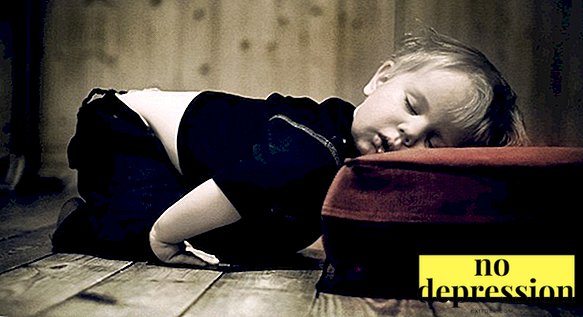The death of a mother is a difficult period in a person’s life.
Survive a similar loss very difficult at any age.
The recommendations of psychologists help overcome the bitterness of loss and find the strength to live on.
Stages of making grief
Every person experiences the death of a mother in different ways due to their individual characteristics and the level of closeness between him and the dead, but still highlight some general trends.
Shock

The death of a mother always leads her children into a state of shock.
Often people don't think that their parents already reached a certain age and may die at any time.
And someone's mother was initially still young and her untimely death due to illness or accident becomes really unexpected.
A deep shock of loss gives rise to some emotional coldness, lethargy is mental defensive reactionwhich aims to alleviate intolerable mental pain. Other people on the contrary behave extremely excited - shout, cry.
Negation
The person refuses to accept the news of the death of a loved one as a real fact. His mind negates the idea that there is no longer a loved one. Often people try convince yourself that what is happening - a bad dream.
The desire to refute what happened can be so strong that others often begin to worry about the mental state of a person.
Denial can occur at an unconscious level. That is, in fact, a person understands that there is no longer a loved one, but subconsciously he continues to perceive him alive: looking for eyes in the crowd, dialing a phone number in the hope of hearing a voice, waiting to appear at the door, etc.
Anger and resentment

The man is constantly thinking of losing and increasingly standard thoughts arise: “Why did this happen?”, “For what?”, “Why didn't the doctors save her?”
There can be a lot of similar questions. They appear not once, but constantly spin in the head.
Gradually arise resentment and anger against peoplethat could directly or indirectly affect the death of the mother. If a woman died as a result of someone else's actions, then anger arises in relation to the perpetrators of the incident.
Appears revengewhich eclipses for a while even the pain of loss. If death occurred for natural reasons, then the blame lies on fate, on society as a whole, on random people.
In some cases, the aggression may be directed at the very dead mother. Son or daughter angry idea that the parent left them alone and caused the suffering.
If after the death of a woman there are material problems (loans, lack of a will, hereditary disputes), then this becomes additional cause for irritation.
Such thoughts have no rational justification, since they arise exclusively at the emotional level. Person can't accept the fact of their helplessness and the inevitability of death that causes anger.
Guilt

Many people tormented by remorse because of committed deeds, unspoken words, etc.
Children convince themselves that if time were reversed, they would behave quite differently.
They endlessly lose out in scenarios "Correct" conversations, events, actions. Instead of endless questions about why everything happened this way, obsessive thoughts appear on the topic “if ...”.
At this stage, there is a departure from the intention find the culprit outward and turning inward.
There are two reasons for this self-criticism: the desire to control the events that take place and to influence them, the overestimation of their ability to prevent the events that have occurred.
Depression
This is the stage at which suffering reaches its peak. People often experience not only mental anguish, but also physical pain. They constantly cry and practically can not control themselves.
Any mention of loss causes a flood of tears. Also, such emotions arise because of feelings of loneliness, self-pity.
Not all depression manifests crying. Often she it is deep inside and externally does not manifest itself.

This is the most negative option, in which outsiders may not even guess about the existing human suffering.
He can only externally show some apathy and depression.
In especially severe cases, depression can lead to thoughts and the worthlessness of one’s own existence, about losing the meaning of life. It seems that without mom, there will never be anything good.
Acceptance and reorganization
There is an awareness of loss on an emotional level. Appears the ability to objectively evaluate your present, make plans for the future.
The loss of a loved one leaves a mark in the soul forever, but already becomes a part of the past life. Lost social ties are restored, the habitual way of life is resumed, interest in significant actions appears, etc.
At this moment, longing comes to the place of suffering, which, over time, will grow into a quiet sadness.
Late mother forever take a certain place in the heart, memories of her will arise constantly, but thoughts about her loss will cease to be the focus of real life.
Psychology tips
I can not survive the death of my mother: how to be? Not everyone is strong self overcome the pain of loss. Psychological advice to help cope with the experiences and continue to live on.
What to do?

Many adults find themselves in complete stupor when they learn about the death of a mother.
Often close people and friends try to protect her children from solving all the organizational moments.
Similar position erroneous. At the moment of a bereavement, it is precisely the activity that helps not to dwell on its grief, to distract.
Therefore, initially follows the maximum load yourself addressing issues related to the organization of the funeral. After that you can deal with hereditary problems, disassembling things, etc. All this will help to occupy thoughts.
Someone to cope with the pain helps preserve the atmosphere that was during the life of the mother. In her house or room, all things remain in their places.
Someone else decides get rid of any loss reminders. This is not a manifestation of ingratitude, but only an attempt to reduce the significance of the loss.
How to cope with the loss?
To take a loss and accept it, you need to clarify for yourself the following points:
- Every person's pain is uniquetherefore, you should not look for universal recipes for getting rid of suffering and listen to other people's advice. We need to develop our own line of thinking and behavior, which will bring tangible relief.
- You should not expect that in a specific time period everything will change. Someone experiences weaken after a month, and someone after two years. It is important to give yourself as much time as required.
- No need to try to replace mom with other people. Her place will always remain empty and this is a fact that cannot be disputed. Children, spouse, friends will help to live on and find meaning for existence, but they will not replace mother.
- Do not be afraid for their state of mind, if the presence of a dead person is felt periodically. It may seem that her voice is heard, the silhouette is visible, the smell is felt. This is a normal phenomenon, which will weaken over time.
- If you can not cope on your own, you should find a good specialist. It will help to cope with this difficult life stage and get out of depression.
- You can not give up, no matter how bad it was. Even the most severe pain sooner or later passes. The thought that living does not make sense is cowardice. The ability to survive in any difficult situation and find the strength to move on demonstrates the will of a person.
It is important not to forget about the sense of duty. Almost always there are people or even animals for which it is worth living.
- Do not hold back tears. Tears help to throw out the accumulated emotions, to get some relief. Both men and women at any age have every right to cry out their grief.
- Need to believe. It is not necessary to be a religious person in order to believe in the existence of another world. None of us knows where people end up after death. Perhaps they really see us and protect us from all adversity. Mom's death does not mean a loss of connection with her. This relationship persists forever.
- We must remember the responsibility to the mother. For any woman, the main meaning of life lies in her children. She dreams that they are always healthy and happy. For the sake of mom's memory, it is important to learn to live anew: enjoy every day, move towards your goals, raise your children.


How to let go?
Usually letting go of the person only after passing through all the above stages experiences of grief.
If the pain of loss still does not leave because of obsessive thoughts that do not give rest, you can go to the cemetery and talk to the deceased. Often it helps to free the soul from the experience.
Also, psychologists recommend writing letters to the deceased. They can not only remember the past, but also talk about their present. It will be create the illusion of communication and help cope with the feeling of loss.
How to deal with feelings of guilt?

I blame myself for the death of my mother: what to do?
Often people build a causal relationship between the incident and your own actions or inaction.
For example, a mother dies while staying at home alone.
The son for the rest of his life blames himself for making a difference if his mother lived with him. it absolutely wrong positionSince we can not affect all the many factors that make up the fate.
In addition to the loneliness factor in an apartment, other aspects were also present in this situation: old age, heart problems, etc.
No one can foresee, calculate, predict appreciate all the many nuances that ultimately lead to the death of a loved one.
The question of death is in the jurisdiction of God. Change fatedestined to someone from above, we are not able to. Accordingly, it makes no sense to blame yourself.
How to ask for forgiveness?
Often negative thoughts about the lack of attention to the mother during her lifetime, about the bad attitude towards her, about offensive words addressed to her do not give to live in peace. There is a desire to return to the past, ask for forgiveness.
But this is impossible to do. But you can come to the grave and talk about everything that worries. It will not be superfluous to go to the temple, to talk to the priest.
Another way to relieve the soul - talk to the deceased before bed. Perhaps she will come in a dream and give a sign that all resentment is forgotten.
How to help her husband survive the loss?

For men, mother has a special meaning, and her loss becomes a big hit.
It is important for a woman to weigh herself correctly in order to support a loved one at a difficult moment.
Not worth it hustling around spouse and trying to take his talk.
If he wants to shut up, you should just sit down next. If the husband wants to speak out, you need to give him this opportunity. It is also important to respect the desire of a person to be alone..
Do not say the words "calm down", "do not cry", "everything will pass." This is the depreciation of the loss of a husband, an insult to his feelings.
The first 3-5 months - period of acute grief. At this time, you need to constantly maintain, listen carefully, patiently endure any manifestations of aggression. Only care and attention will help her husband overcome the crisis.
As a rule, within a year of experiencing gradually subside, and the man begins to return to his typical behavior.
Mom's death is always big loss for man. Practicing the advice of psychologists will help overcome the bitterness of loss and gradually return to a full life.
My mom died. How to survive the death of mom? Personal experience:



